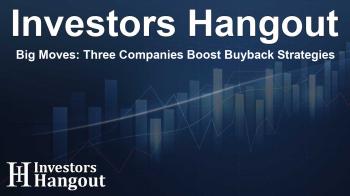Big Moves: Three Companies Boost Buyback Strategies

Companies Making Strategic Buybacks
Companies engage in share buybacks when they recognize positive potential in their stock, which can appear when shares are either declining or rising. When a company's shares are falling, management may consider it a buying opportunity, believing the markets have overly reacted to negative news. An illustrative case is Deckers Outdoor, whose stock faced significant declines recently. In response, they executed record buybacks, showcasing their confidence in the stock's recovery.
Conversely, when share prices rise, companies may still opt for buybacks, suspecting that the markets are underestimating their potential value. This is evident with Spotify Technology, VeriSign Inc, and Newmont Goldcorp Corp. Each of these companies is currently outperforming the broader market and has recently announced significant increases to their buyback capacities.
Spotify's Impressive Buyback Strategy
In 2025, Spotify's stock has surged by approximately 40%, a remarkable achievement when compared to the S&P 500's modest returns. Following a dip in share price after their earnings announcement, Spotify recognized an opportunity and has authorized a remarkable $1 billion increase to its share buyback program. This strategic move underscores their belief that the stock remains promising and that its upward trajectory will continue into the foreseeable future.
The dip in stock price alongside the augmented buyback signals that Spotify likely views this as a moment to purchase shares at a favorable valuation. With the dynamics of Spotify's advertising sector evolving, the company is optimistic about making substantial gains in the upcoming year.
VeriSign’s Confident Market Position
VeriSign has delivered an impressive total return of about 29%. Recently, they declared a considerable $913 million increase to their buyback capacity, raising it to approximately $1.5 billion, which represents around 6% of their total market value. This substantial amount enables VeriSign to effectively reduce its outstanding share count while amplifying its earnings per share (EPS).
Moreover, Berkshire Hathaway remains one of the largest shareholders of VeriSign. Despite Berkshire's recent decision to decrease its shareholding for regulatory compliance, they still maintain a significant percentage ownership. This adjustment should allay investor concerns about potential bearish sentiments surrounding VeriSign.
Newmont’s Bold Moves in the Gold Market
Newmont, a leading name in gold mining, has recorded a remarkable 70% return this year. In its recent earnings report, the company announced an impressive addition of $3 billion to its buyback program, bringing its total share buyback capacity to about $3.2 billion—equating to roughly 4.6% of its market capitalization. This increase reflects Newmont's confidence in its ongoing business potential.
With analysts predicting a rise in gold prices from $3,350 per ounce to $4,000 per ounce by mid-2026, Newmont’s optimistic stance aligns well with its aggressive buyback strategy. This potential price rally for gold further justifies Newmont's decision to boost its buyback capacity.
Understanding the Implications of Buybacks
Overall, substantial increases in buyback authorization can signal positive intentions from management, enhancing shareholder returns while also lowering the total number of outstanding shares. For Spotify, VeriSign, and Newmont, their recent moves correspond with strong market performance, suggesting ongoing confidence in the fundamentals driving their businesses.
However, investors should remain cautious. Management’s desire for increasing share prices is often intertwined with their compensation, which is typically tied to stock performance. Hence, buybacks can sometimes serve to artificially bolster stock prices. This does not entirely dismiss the implications of the buybacks, but investors should ensure that the companies exhibit strong free cash flow, reliable earnings forecasts, and that buybacks are not prioritizing over crucial strategic investments.
Frequently Asked Questions
What are share buybacks?
Share buybacks occur when a company repurchases its own shares from the marketplace, reducing the total number of outstanding shares and potentially increasing the value of remaining shares.
Why do companies increase their buyback capacities?
Companies may increase buyback capacities to signal confidence in their stock performance, utilize surplus cash strategically, and enhance shareholder value.
How do buybacks affect stock price?
Buybacks can positively influence stock prices by reducing supply, which may increase demand and drive up price. However, the effectiveness can vary based on broader market conditions.
What role does management compensation play in buybacks?
Since management often receives stock-based compensation, they may favor buybacks as a way to elevate share prices, benefiting their financial incentives.
Should investors be cautious about buybacks?
Yes, while buybacks can be a positive signal, investors should maintain a healthy skepticism and analyze the underlying financial health and strategic direction of the company.
About The Author
Contact Logan Wright privately here. Or send an email with ATTN: Logan Wright as the subject to contact@investorshangout.com.
About Investors Hangout
Investors Hangout is a leading online stock forum for financial discussion and learning, offering a wide range of free tools and resources. It draws in traders of all levels, who exchange market knowledge, investigate trading tactics, and keep an eye on industry developments in real time. Featuring financial articles, stock message boards, quotes, charts, company profiles, and live news updates. Through cooperative learning and a wealth of informational resources, it helps users from novices creating their first portfolios to experts honing their techniques. Join Investors Hangout today: https://investorshangout.com/
The content of this article is based on factual, publicly available information and does not represent legal, financial, or investment advice. Investors Hangout does not offer financial advice, and the author is not a licensed financial advisor. Consult a qualified advisor before making any financial or investment decisions based on this article. This article should not be considered advice to purchase, sell, or hold any securities or other investments. If any of the material provided here is inaccurate, please contact us for corrections.

